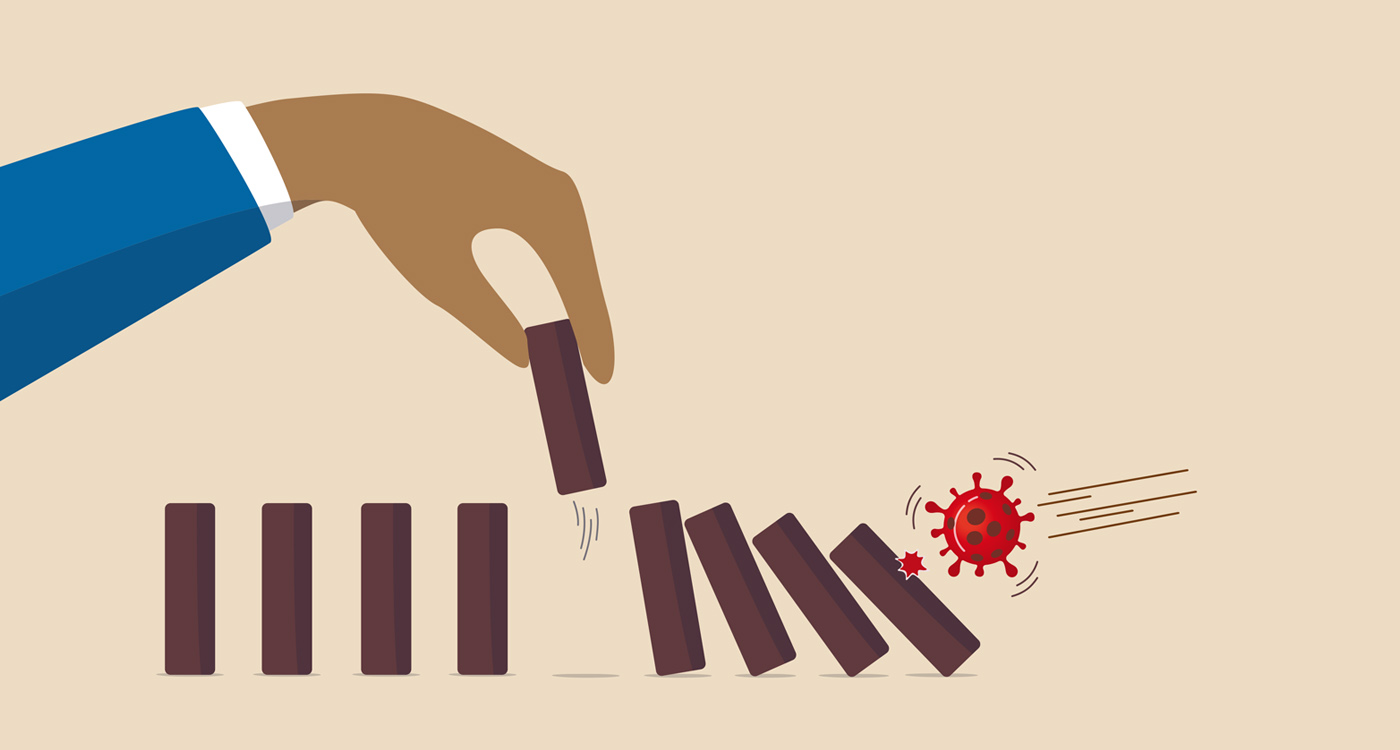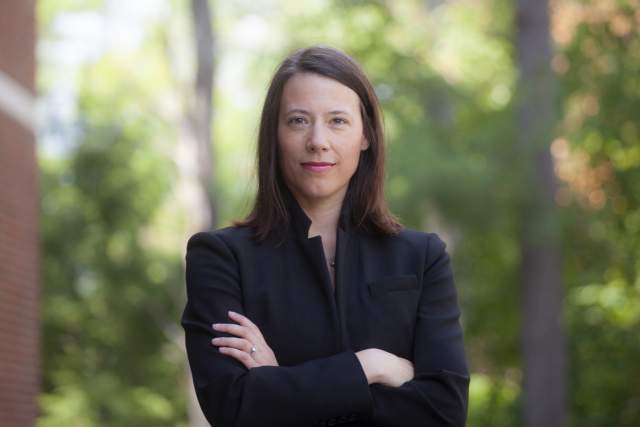Tuck Alumni on How to Lead During a Crisis
In three virtual events, alumni on Tuck’s Advisory Board and the MBA Council spoke with Dean Matthew Slaughter about navigating the pandemic as business leaders of their organizations.

The past year has been rife with challenges, but also opportunity.
Recognizing that we are living through an unprecedented event that could contain powerful leadership lessons, last spring Tuck launched the Board Chats series—virtual events for members of the Tuck community to spend time with some of the school’s most accomplished and generous alumni who serve on Tuck’s advisory boards and councils. This fall, Tuck and Dean Matthew Slaughter invited alumni speakers from the NBA, Citigroup, Brooks Running, and more to hear how they are reacting and responding to the economic upheaval taking place across the globe.
From managing risk in finance to navigating industry shifts during the pandemic, here’s what seven Tuck alumni had to say about leading through a crisis.
Managing Risk in Financial Services
Brad Hu T’89
Chief Risk Officer, Citigroup
Jen Moyer T’98
Chief Administrative Officer, White Mountains Insurance Group
Jose Minaya T’00
Chief Executive Officer, Nuveen Investments at TIAA
1. How does your organization look externally at risk in the global economic and capital markets, and how does that interact with how your firm has been doing during the pandemic?
Hu Risk management doesn’t happen when you’re in a crisis. All the real work is done in the five or six years leading into the crisis and the firms that do well are those that prepare themselves well. We spent a lot of time after the global financial crisis diversifying our portfolios, really understanding our risk, setting risk appetites, making sure we have all risk captured and thought-through. We also partnered with the Federal Reserve on their lending and liquidity programs, which they launched with speed and conviction.
Moyer In a regular time, the risk assessment with our portfolio of companies includes things like company-wide risk assessments, IT risk assessments, strategy implementations and those risks. Now, we’ve been working closely with our portfolio companies to share best practices, communicate frequently, and make hard decisions when a new strategy assessment is needed. We have one company in our portfolio with an innovative travel insurance product and they had begun a rollout in a new market in Israel. We rolled out the same product in Australia. Keeping that going when travel isn’t happening has meant pivoting on that.
Minaya We went into 2020 thinking that the returns over the next decade are going to be lower than the previous 10 years. More volatility, lower rates. COVID-19 didn’t change that, but it did accelerate those issues. The good thing about this crisis is we know how it ends and we know how to provide stimulus. I’m very optimistic about where we’re trending now.
"We found we can work from home pretty seamlessly. We accelerated our digital capabilities and did things that would have taken us five years to do. That’s going to change how we do business going forward."
Jose Minaya T’00
CEO, TIAA
2. How do you manage risk at the level of your firm?
Hu We surprised ourselves at how effectively we’ve been able to work in a work-from-home environment. 250,000 people working remotely — it was an unknown. In the long run, we need to think about how to get people back in the office in a hybrid sense. This is an apprenticeship business. Everything I learned about my jobs I learned from watching great practitioners.
Moyer This aspect of risk management has been as big as anything else we’ve been doing this year. We’re lucky, we went remote seamlessly. But we really like working together. People get a big hit out of the social interactions at work. We are very concerned with mental health, very concerned with connecting. Our feedback from employees will drive some of our strategy in 2021.
Minaya From March to May, the internal stuff was all we focused on. We were one of the first firms in New York and globally to have all 15,000 employees work from home for the foreseeable future. We found we can work from home pretty seamlessly. We accelerated our digital capabilities and did things that would have taken us five years to do. That’s going to change how we do business going forward. And I was amazed at the engagement of our people; the crisis brought everyone together.
3. How are you doing as a leader?
Hu I used to be on the road all the time. Now I do virtual visits, because people want to stay connected and understand our direction. Instead of rushing on my commute, I run five miles every day and I’m in the best shape of my life.
Moyer One of my mottos is to focus on what you have instead of what you don’t. We are living that out in real-time as a family. We did a candy walk in the woods for Halloween, instead of trick-or-treating. I can get into the woods for a 20-minute walk. You have to step away, make the best of a bad situation, and model that for your kids.
Minaya One of the key things in life and your career is embracing adversity. I stepped into the CEO role in January, and people said it was unfortunate timing. I don’t think so. This is when you’re judged. You embrace the situation and see what you’re really made of. I’m pushing optimism. We own malls in Wuhan and other areas in China. When they opened up, we called it the revenge economy: it was through the roof.
Navigating Industry Shifts in the Age of COVID-19
Jim Weber T’86
Chairman and CEO, Brooks Running
Rick Cardenas T’98
Chief Financial Officer and Senior Vice President, Darden Restaurants
Kate Jhaveri T’03
Chief Marketing Officer, National Basketball Association
Moderated by Dean Slaughter, alumni were asked to describe their business contexts before and during the pandemic and how they learned along the way, and to discuss the outlook for next year.
Going into the pandemic
Weber We came into the pandemic with great momentum, growing 10 to 20 percent every month for two years. We watched the virus roll through our supply chain in Asia. It proved very resilient. Then we watched it hit Europe, where the stores closed in one week. Then it hit Seattle and the rest of the U.S. We were firing on all cylinders, and then it froze.
Cardenas January/February was a really good time for us. We were a company with $9 billion in sales and $14 billion in enterprise value. In March, our price per share dropped from $110 to $34. Within a three-week period, we went from euphoria to “are we going to survive?”
Jhaveri January/February was a really good time for us. We were a company with $9 billion in sales and $14 billion in enterprise value. In March, our price per share dropped from $110 to $34. Within a three-week period, we went from euphoria to “are we going to survive?”
"What I learned and keep learning is what kind of business we’re in: we are a people business and can’t survive without our team of 160,000 employees. We had to protect them, so we instituted an emergency pay program."
Rick Cardenas T’98
CFO and SVP, Darden Restaurants
Learning to Make Sense of the Pandemic
Weber We lost our radar about consumer demand. We made a lot of phone calls to other brands who watched the curve come through China and what demand recovery looked like. We started sensing running participation, using park counts of runners and Strava data. We assessed how running was changing, looking for signals that would give us the confidence to keep ordering inventory. Our lifeboat was digital commerce sites. By the third week of April, weekly sell-throughs had started to exceed the prior year.
Cardenas We deal with viruses all the time. We know how to keep people safe. We made the decision to close all dining rooms before states did. What I learned and keep learning is what kind of business we’re in: we are a people business and can’t survive without our team of 160,000 employees. We had to protect them, so we instituted an emergency pay program. We furloughed managers but paid them, and instituted sick pay, something no casual dining restaurants do. We spent $100 million on our team. Today, our market cap is higher than it was in January, by $500 million. That’s because people are looking at two years from now, not the next six months.
Jhaveri From a business model perspective, we make money through tickets and in-arena sales. And through our marketing and TV partners who broadcast our content around the globe. When we paused our season on March 11, we stopped virtually all our revenue. We started daily leadership meetings with Adam Silver, the commissioner, and began taking in as much information as we could. We wanted to end the season with the NBA finals, and we started to think how we would do that. We chose a single site location for 22 teams, with health and safety protocols, so we could entertain millions with good content. Players did PSAs for TV and social, which reached 600 million people and raised $100 million for PPE for frontline workers. We learned a whole new way to engage fans through social and digital. We will keep using these long after the pandemic.
"Brand matters a lot. Having a strong brand that means something—that’s even more powerful now."
Kate Jhaveri T’03
CMO, NBA
Looking Ahead to the Next Six Months
Weber We think it’s going to be tough. Psychologically this has been hard on people. Winter is going to be tough. Running is going to turn on next summer; it’s an anecdote for stress. I’m very optimistic about 2021 for our category.
Cardenas The number one thing people will want to do when this is all over is go out and eat with friends and family. After the 1918 pandemic was the Roaring 20s.
Jhaveri We are trying to understand where fans are and how to serve them. I learned that brand matters a lot. Having a strong brand that means something—that’s even more powerful now. Flexibility has been paramount for employees. Some are managing toddlers at home while still working. I think this winter will be tricky. The live entertainment business will have to find new ways to engage people.
Personal Leadership in Action
Langley Steinert T’91
Co-founder of TripAdvisor and Founder and CEO of CarGurus, Inc.

